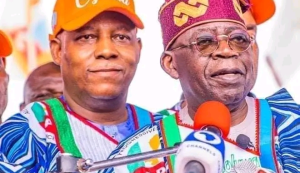The Vice President Kashim Shettima has taken a swipe at President Bola Tinubu, declaring that the President had no constitutional power to remove Rivers State Governor Siminalayi Fubara or any sitting Governor from office. Shettima’s remarks, delivered during a book launch in Abuja on Thursday, July 10, 2025, have ignited a political firestorm and intensified speculation of a deepening rift within the Tinubu-Shettima alliance ahead of the 2027 elections.
The controversy stems from President Tinubu’s unilateral decision on March 18, 2025, to sack Governor Fubara and appoint a retired military general as acting governor, a move ratified by the National Assembly amid swirling allegations of financial inducements. Critics condemned the action as unconstitutional and a direct assault on Nigeria’s democratic foundation, while supporters hailed the move to restore peace to Rivers State. Governor Fubara, a member of the opposition, has remained out of office since his controversial ousting.

Shettima, speaking at the launch of former Attorney-General Bello Adoke’s book; OPL 245: The inside story of Nigeria’s $1.3 Billion Oil Block deal, recalled how former President Goodluck Jonathan was once advised against removing him as Borno State governor. Drawing from that experience, Shettima emphasized that not even a local government councillor can be removed by presidential fiat. “He was elected like you,” Shettima said pointedly, defending the sanctity of the electoral mandate and signaling strong opposition to executive overreach.
Read Also:
The vice president’s public challenge has laid bare what many political observers describe as mounting tensions between Nigeria’s two top leaders. Insiders say the APC’s unity is being tested like never before, especially after a recent endorsement of Tinubu for a second term in 2027 excluded Shettima as his running mate, a move that infuriated supporters and triggered violent outbursts during a North-East APC stakeholders’ meeting in Gombe on June 15.
The development has revived memories of Tinubu’s tenure as Lagos State governor, during which he frequently shuffled deputy governors. Analysts warn that Shettima’s place on the 2027 ticket may be in jeopardy, especially as Tinubu reportedly shifts political focus to the vote-rich North-West. Despite delivering Borno for the APC in 2023, Shettima’s North-East base contributed little else, a fact that may be fueling speculation about his diminishing influence.
At the heart of Shettima’s pushback is the Nigerian Constitution, which clearly outlines the process for removing an elected governor, through impeachment by the state assembly, resignation, or a court ruling. Legal scholars have backed Shettima’s stance, calling Tinubu’s action a dangerous and unconstitutional power grab that undermines the democratic process.
Online reactions to Shettima’s statement have been swift and divided. Many from the North-East applauded what they see as a principled stand against impunity, while others view it as the beginning of a larger political fallout. Hashtags such as #ShettimaVsTinubu and #FubaraRemoval are trending on X (formerly Twitter), with users praising Shettima for standing up to what they describe as autocratic leadership.
So far, the presidency has remained silent on Shettima’s comments. That silence, analysts say, speaks volumes and suggests the rift could widen if not swiftly managed. Tinubu’s government may find itself increasingly vulnerable, especially if high-ranking insiders begin to dissent publicly.
The implications of this fallout are enormous. A fractured APC could lose momentum heading into 2027, especially if the Shettima camp, emboldened by grassroots support in the North, decides to chart a separate course. Meanwhile, the unresolved Fubara debacle continues to raise urgent questions about the limits of presidential power and the fragility of Nigeria’s democratic institutions.